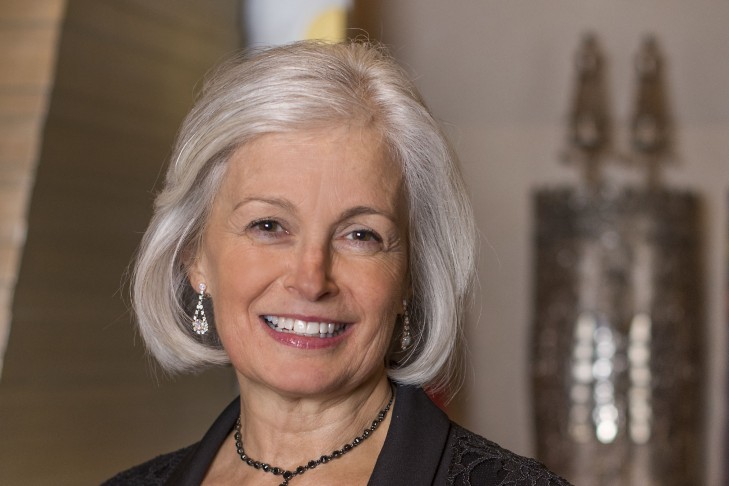“Trust your crazy ideas,” encourages the sign in Rabbi Elaine Zecher’s book-lined office. It’s a piece of unconventional advice that Zecher has followed throughout her career as Temple Israel of Boston’s first woman rabbi. Twenty-six years after her arrival, Rabbi Zecher is poised to take the reins as the temple’s first female senior rabbi. She will be installed on Friday, Sept. 16.
Zecher grew up in Monroeville, Pa., a small Pittsburgh suburb, where her parents were one of the founders of the town’s Reform temple. In a wide-ranging interview with JewishBoston, Zecher recalled that her father “was very clear that it was our responsibility to make sure that Judaism survived. My brother, sister and I took that injunction quite seriously.” Zecher’s older sister is also a Reform rabbi, and a number of years ago her brother immigrated to Israel, where his Jewish practice is Orthodoxy.
Upon graduating from Hebrew Union College in 1988, Zecher took a position at the Jewish Community Center in Stoughton. After two years at the JCC, she realized that she wanted a congregational life. “I wanted to have an impact on the kind of experience that people can have in their Judaism and in Jewish living,” she said.
When she came to Temple Israel in 1990, she observed that “the congregation was definitely ripe” for her presence. “There were women in the congregation who, up until that point, had devoted their lives to early feminism, to establishing feminism,” she said. “Some had written ‘Our Bodies, Ourselves.’ By the time I arrived I felt that people were saying, ‘What took you so long?’”
Zecher’s appointment opened up a well of interest for many women, which included the founding of a women’s study group. The group eventually grew into a women’s kallah—a weekend convention devoted to study. Zecher recalls that at the first kallah, women passed the Torah to each other, and for many of them it was the first time they had held a Torah. “That accessibility meant a great deal for women,” Zecher said. “At my first installation, women were crying because it was also the first time they were seeing in their home a woman leader. They had worked so hard in the fields in terms of making sure that women had equal rights, and here was their rabbi.”
The congregation was with their rabbi through the births of her three children; they were with her through the death of her father and her battle with breast cancer. After a rigorous course of treatment for the disease, Zecher decided to train for and run the 2004 New York City Marathon. Already an accomplished long-distance runner, Zecher remembered that at the time, “I wanted to be in charge of my body.” In an essay she published about the experience, she wrote that as she ran across the 59th Street Bridge, “every sense comes alive: the feel of the wind swishing, the sound of running shoes thumping on pavement, the breathtaking sight of Manhattan, the taste of tangy Gatorade. I feel centered, alive again. In my cancer years a part of me had died, extinguishing some magic untraceable spark inside of me. As I move from that silent bridge to First Avenue’s roaring crowds, I feel like I have been returned to life.”
Zecher is still an avid runner, participating in two area half-marathons every fall. “The act of running is very meditative for me,” she said. “It’s not because all thoughts leave my mind; it actually helps me focus my thinking. I don’t like to run with earphones. I run to the sounds of the world and my mind.”
While running may be a form of ad-hoc prayer for Zecher, she also has a more formal role in shaping Reform Jewish liturgy as chair of the Central Conference of American Rabbis Worship and Practices Committee. Zecher had a pivotal role in the creation of “Mishkan T’filah,” the Reform movement’s weekday and Shabbat prayer book. She was also part of the editorial team that created the movement’s new High Holiday machzor, or prayer book, “Mishkan Hanefesh.” Zecher pointed out that regardless of affiliation, the Reform machzor is a prayer book for everyone. “On the cover it doesn’t mention the Reform movement; it says it’s a machzor for the Days of Awe,” she said. “It’s everyone’s machzor. And by using it, it allows you to enter into the mishkan [the place where God dwells] to do the sacred work of the holidays. It has a lot of additional readings that surround the core readings so people can find their voice. In essence, they speak to the machzor as the machzor speaks to them.”
That duet of voices is at the heart of what Zecher calls an “integrated theology.” In having a hand in assembling “Mishkan T’filah” and “Mishkan Hanefesh,” Zecher was intent on bringing many voices to express different ideas of God. Her physician husband, who has been involved in integrated medicine—a practice that supports more traditional therapies, such as surgery or chemotherapy, and alternative methods, including meditation or acupuncture—inspired her to set a concrete goal of inclusion. “By bringing all of these [ideas] together, it actually created something more integrated and holistic,” she said. “For example, God is Avinu Malkeinu [Our Father, Our King] while at the same time acknowledging that God is the strength within me.”
As for her hopes and dreams for Temple Israel, the Boston Jewish community and the Jewish people, Zecher says her rabbinate’s mission is “living Judaism together, and we do that through discovery, through dynamic spirituality and through righteous impact. Just as [the biblical] Jacob woke up and said, ‘How awesome is this place,’ I’m working to ensure that our members know that, but also that the Greater Boston community knows how awesome this place is and how accessible it is. Temple Israel is a place for anybody, wherever they are on their Jewish journey.”



